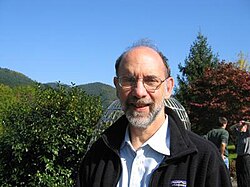Spencer Bloch | |
|---|---|
 Bloch at Oberwolfach in 2004 | |
| Born | May 22, 1944 New York City |
| Alma mater | Harvard College Columbia University |
| Known for | Bloch–Kato conjectures |
| Scientific career | |
| Fields | Mathematics |
| Institutions | University of Chicago |
| Doctoral advisor | Steven Kleiman |
| Doctoral students | |
Spencer Janney Bloch (born May 22, 1944; New York City [1] ) is an American mathematician known for his contributions to algebraic geometry and algebraic K-theory. Bloch is the R. M. Hutchins Distinguished Service Professor Emeritus in the Department of Mathematics of the University of Chicago.